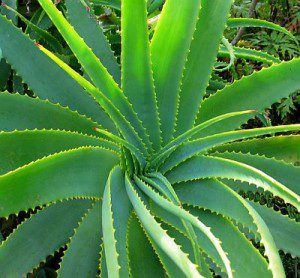By Sayer Ji
Contributing writer for Wake Up World
There is plenty of research that indicates that the unnaturally accelerated aging process associated with modern living and/or natural environmental exposures such as excessive ultraviolet radiation (photaging), can be slowed. In fact, over 150 natural substances have been indexed on the GreenMedInfo.com project with demonstrable “anti-aging,” or if you prefer, “longevity-promoting” properties.
Of the 69 natural substances indexed on GreenMedInfo.com of potential value in skin aging, aloe is one of the most compelling substances, and works from the inside out.
In a study published in the journal Annals of Dermatology in 2009, healthy female subjects over the age of 45, and who received received 2 different oral doses (low-dose: 1,200 mg/d, high-dose: 3,600 mg/d) of aloe vera gel supplementation for 90 days, saw remarkable results. The researchers measured clinical signs and biochemical changes of aging skin before and after supplementation and found that “After aloe gel intake, the facial wrinkles improved significantly (p<0.05) in both groups, and facial elasticity improved in the lower-dose group.” They concluded: “Aloe gel significantly improves wrinkles and elasticity in photoaged human skin.”
Keep in mind that 3,600 mg of aloe a day is not what you would call a “megadose,” as it is a little less than a teaspoon. 1,200 mg is only a quarter of a teaspoon, and in fact, according to the study, may actually be superior to the higher dose at improving facial elasticity; less is sometimes more, one can assume.
Also, the amazing thing about aloe is that it has a wide range of potential “side benefits,” with 50 of them viewable on GreenMedInfo’s Aloe Research Page alone.
About the author:
Sayer Ji is the founder and director of GreenMedInfo.com and co-author of the book The Cancer Killers: The Cause Is The Cure with New York Times best-seller Dr. Ben Lerner and Dr. Charles Majors. His writings and research have been published in the Wellbeing Journal, the Journal of Gluten Sensitivity, and have been featured on Mercola.com, NaturalNews.com, Reuters.com, GaryNull.com, and Care2.com.
[pro_ad_display_adzone id=”110027″]







